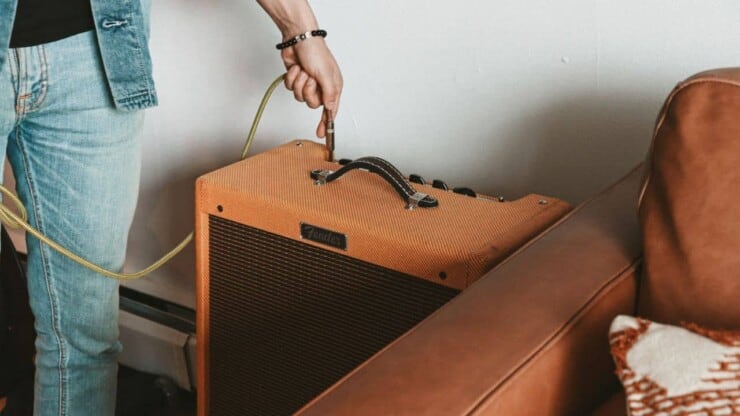Have you been having issues with amp buzz when guitar plugged in, but you’re unable to fix it? Don’t worry, you’ll get to know all about that here.
Guitar amp buzzing is a common issue that many guitarists have. The buzzing happens due to heavy usage or faulty components, while a hissing sound is produced due to high-volume settings.
In this article, you’ll get to know all about guitar amp buzzing, why is my guitar amp buzzing, different types of guitar amp buzzing, how to get rid of guitar amp hum, and more. Continue reading to get all the answers and fixes you’re looking for.
Guitar amp buzzing ruining your guitar’s sound?
There aren’t many things that ruin the guitar’s tone more than the annoying buzzing or humming noise. Guitar amp buzzing can ruin your recordings and be a really irritating issue when performing live. But why are guitarists often left asking themselves, “why is my guitar amp buzzing”?
Guitar amp buzzing sound usually occurs because of heavy usage and faulty component. Meanwhile, guitar amp hissing is caused because of high-volume settings. Amp buzzing could happen at any time with the buzzing amount varying depending on the design and the amp’s sound.
Sometimes, even healthy guitar amps can make noise when they’re idle. Buzzing or humming doesn’t necessarily mean that your amp is broken. It’ll ultimately depend on how bad and how often your amp is buzzing. It can be quite annoying when you’re playing beautiful guitar and the speakers start crackling. Not only that, but it can instantly turn an otherwise mesmerizing audio experience into an uncomfortable listening session.
Different types of guitar buzz, hum, and noise
If your amp buzzes when guitar plugged in, you’ll want to know what type of problem it is. Knowing what type of noise your guitar amp is making will help you figure out what is causing it. Here are some of the different types of guitar buzz, hum, and other noises –
Mains hum (50 or 60-cycle hum)
This is arguably the most common form of humming noise you’ll hear in electric guitar amps. All the wiring in your home or performance venue will emit an electromagnetic field. This impacts the guitar’s signal and results in noise. In the United States, the electricity alternates at 60Hz (50Hz outside of the US), which is why this is called “60-cycle hum”. If the pitch of the hum sounds similar to the traditional 50 or 60-cycle hum, then it means it’s a mains hum issue. Even if the noise sounds slightly different or if the pitch is similar to the usual 50 or 60-cycle hum, then it’s a mains hum issue.
To know how to get rid of guitar amp hum, you’ll want to know why this happens. Mains hum is caused by all the wiring in your house or the performance venue creating an electromagnetic field. This means that the mains hum you’re hearing depends on what room or venue you’re in. Dealing with this hum will mean figuring out which devices or wiring is causing this issue.
For instance, fluorescent lights can create a lot of hum. If you’re having fluorescent lighting in your room, you should turn off the lights. Then carefully listen if this changes the amount of hum in the guitar amp’s sound. If it makes the difference, you’ll know it was a part of the issue.
Another way to figure out what is causing the hum is by picking up the guitar and moving around the room. Use your guitar as a hum-homing device. More it near the electric devices that are switched on and listen if there is any hum. Are you hearing the hum increase when the guitar is moved closer to the device? Sometimes, electronic devices like desk lamps are all that’s required for reducing the hum.
Ground loop buzz
A group loop can be defined as the circuit loop formed once two pieces of audio equipment are connected. This is the case with the electric guitar and the amp. If there is a different ground potential, the current can flow on the cable that is connecting them. This results in the buzzing noise in the guitar amp. For resolving the type of hum, you’ll need to use a balanced alternating current power supply.

Have you ever gotten a buzzing sound when the lead is plugged into the guitar amp but not plugged into the guitar? Once you touch the end of the lead, the buzz suddenly disappears? This buzz occurs due to a lack of grounding. If the guitar has a grounding issue, it’s often due to a poor connection or bad soldering. Say that you’ve bought a cheap guitar on eBay or another online platform, and you’re having terrible buzzing that simply won’t go away when touching the strings or playing the guitar. There is a high probability that the guitar could have been wired poorly.
By rewiring the guitar completely, you can remove the buzzing issue. If you purchase a new guitar altogether, it’s unlikely that you’ll experience this kind of buzz. However, if you’re buying a second-hand guitar, and it is buzzing uncontrollably, you know where to check.
String buzz
Another common type of amp buzzing happens due to a faulty guitar. For instance, frets and string buzzes can easily occur when the string comes into contact with the fret. It can be due to a loose fret or worn nut slots that are forcing the string arrangements to interfere with the frets. This kind of buzzing can be easily corrected by tightening the loose frets or replacing the nut slot to add more distance between the string and frets.
Electronic sources
Electricity and electronic devices can greatly contribute to amp buzzing. The alternating current in the building’s electrical wiring tends to generate electrical and electromagnetic fields. These fields facilitate the buzzing noise often observed in the guitar amps. There are other electronic devices as well that lead to buzzing, such as TV monitors, computers, light fixtures, and more. These variables interact with the guitar’s wiring and produce the buzzing sound on the amp in certain situations.
Why do some guitars and amps buzz more than others?
Different types of guitar pickups result in different levels of buzzing and humming noise. Using a humbucker will help you eliminate a lot of noise as compared to a single-coil pickup. A guitar having a single-coil pickup will produce more hum or noise than guitars with humbuckers. If you have a guitar with a mixture of humbucker and single-coil pickups, you’ll notice a huge difference in the noise level when you switch back and forth between the pickups.
How you deal with the buzzing and other noise will depend on what tone you wish to have. You can change the pickups to something that produces comparatively less hum, but also changes the tone. For instance, if you’re using a Telecaster (which is rather noisy), changing the pickups will make it sound less like a Telecaster.

If you’re using a single-coil pickup and want to retain the sound, there are a few options. Fender’s Hot Noiseless Pickups for Telecasters and Stratocasters are designed for giving you the classic tones of single-coil pickups, but without the buzz and hum. Alternatively, you can even try to shield the pickups and components as much as possible. It’ll be a cheap option to try before you go about replacing the pickups entirely. If you’re using a budget guitar, a lot of noise will probably be because of the cheap pickups. Upgrading the pickups can have a tremendous impact on the tone and noise level.
How to fix my guitar amp buzzing issues?
Often, when you’re playing the guitar, you’ll be left wondering why is my tube amp buzzing. During such moments, you’ll want to know the reasons and the fixes for the amp buzzing. A guitar amp can make buzzing noises due to reasons like dirty jacks, weak power cords, faulty connections, or broken solder connections in the circuit.
Different factors could contribute to the amp buzzing. You should check your guitar amp and look for any issues. Is it when you’re turning the volume up or down? Is the sound cutting when you’re playing high notes? Is the bass causing the buzzing noise? Finding the cause of the buzzing noise will be vital when you’re fixing it. Once you’ve found the cause of the noise, it’ll be an easy to fix. Who knows, sometimes the problem might be with the guitar or the cables and not the amp –
1. Replug the guitar and amp cables
You could fix the buzzing guitar amp by replugging the connection jack into the guitar and guitar amp. Often, there could be a loose connection with the audio jack, causing distortion in the guitar amp’s sound. You should check whether the guitar is working properly or not before checking your guitar amp. Sometimes, a faulty connection between the guitar and the guitar amp can create a lot of distortion and buzzing noise.
If you’ve got another guitar, try to plug it into the guitar amp. Then, check if the problem persists or goes away. If it stays, you’ll need to take your amp to a guitar shop and get it checked. If the other guitar is working fine but your preferred guitar isn’t, then it means there is an issue with your guitar and not with the amp.
2. Replace the cables
Cables can have numerous faults that might have developed over time. A bent cable could easily cause static, while a bare wire could worsen it. A simple, inexpensive replacement can make the guitar buzzing vanish pretty quickly. If you’ve got another cable with you, try to use it instead. Then, check if the guitar amp is still having a buzzing noise.
There is another way of checking if the cable is the issue. Plug the jack in the amp while pressing your thumb on the other end. You should be hearing a buzz in the sound, but it shouldn’t be a crackle. The crackling sound will mean that the wire is causing the problem.
The final thing that should be done here is to press your thumb on the connector jack while still connected. There should not be any difference in sound. In case there is, then it indicates a defective cable or a defective guitar jack. When you’re buying cables, you should ensure that you’re going for sturdier, thicker cables with a decent connector jack. The cables should not break or bend easily.
3. Examine the power cord
Bad power cords can easily cause guitar amps to buzz as there isn’t enough electrical supply. You should check the cable you’re using and ensure that you use thicker cables capable of offering enough power.
Cables normally go through a lot of wear and tear. It is natural for them to get worn out after a certain time. There are two things that happen to the power cables – either the power cable goes bad or the connector. Either way, you’ll have to change the power cord and check if it’s making any difference. Check for the bad cable before you buy a new one by wiggling it for a bit when it’s plugged in and the guitar is connected to the guitar amp. This is essentially the same trick that you’ll be using for checking for the connector in the guitar.
4. Clean the audio jacks
Dirty input jacks are capable of causing a lot of amp buzzing noise when playing. You should clean them out by spraying the cleaner onto a cotton swab. Insert the swab and carefully rotate it a couple of times. Repeat this until it gets cleaned from the inside. Then, allow it to dry for an hour or so before plugging everything back in.
Guitar jacks could be an issue, similarly, amp jacks can also be a problem. This can happen due to dust getting accumulated inside the jack. Giving them a thorough cleaning will ensure better performance from the jacks.
The easiest way of cleaning the jacks will be putting a few drops of rubbing alcohol onto a Q-tip, putting them into the amp jacks, and then rotating them. Once you remove the Q-top, you’ll probably notice a lot of dirt accumulating on it. Once you’re done cleaning, wait for an hour or two before plugging in the electric guitar. If you’re noticing better sound, then you’ll know that the dirty jacks were the reason for the buzzing.
5. Clean the pots in the guitar amp
Dust and grime build-up on the guitar pots could cause unwanted static noise or buzz through the amp. Clean the pots using an electric contact cleaner. Remember to move the knobs to ensure that they’re being spotless.
The pots on the amps and the guitar could cause the sound to cut out. This happens when they aren’t being used for extended periods of time. There are many factors that can contribute to non-optimal sounds, like dirt or improper tuning or grime buildup. When you’re turning the knobs, your problem will lie in the pots if you’re hearing the distortion.
Cleaning them will be fairly simple, and you’ll only have to use an electric contact cleaner. A quality contact cleaner will remove any oil, dust, dirt, or unwanted residues from the surfaces of sensitive electronics.
6. Plug the amp into different power outlets
There isn’t a lot more that you can do for fixing the guitar amp at home. However, you can still plug the amp into different power outlets and see if the buzzing still persists.
You can try changing the rooms and using different power outlets. Try to play in different areas and in different positions to see if the amp’s sound is still being affected. If nothing works, you’ll need to get the amp checked by a professional, as it’ll likely be a more technical issue.
7. Resolder the connections
Broken solders on circuits might be another factor that causes the amp to create buzzing or humming noise. Moreover, it can also lead to the sound getting cut out.
Wires can end up disconnecting or becoming loose, causing distortion in the sound or causing it to be cut out. You should use a soldering iron for resoldering the loose connections. If the previous methods don’t work, then resoldering will definitely do. Solders can sometimes break because of reasons like humidity, change in temperature, and physical damage. You’ll need professional tools like a solder socket and a soldering iron. If you aren’t experienced in these repairs, it’s suggested that you should avoid doing it. Instead, take the help of a professional.
Guitar amp buzzing even when nothing is plugged in
A guitar amp buzzing when nothing is plugged in can be caused by loose solder connections. If the amp is creating a humming noise, then it might be because of loose earthing connections. Most likely, it’ll be a loose wire strand contacting the center, causing the humming noise.
You’ll need to check for how long the buzzing lasts after everything has been unplugged. If the buzzing stops fairly quickly, then it means your amp is fine. If the amp retains charge despite unplugging and keeps on buzzing, then the amp is faulty. It must be fixed by a professional electrician as soon as possible. Another way to check for the problem is by trying out different electrical outlets. You should preferably use the ones without any other connections like lights or a dimmer switch.
Conclusion
Thank you for reading. Hopefully, now you know a lot more about guitar amp buzzing, why is my guitar amp buzzing, different types of guitar amp buzzing, how to get rid of guitar amp hum, and more. Buzzing and humming on guitars is a fairly common problem that most guitarists face at some point. The buzzing happens due to a plethora of reasons. The most common reasons include loose cables, faulty connections, heavy usage of the amp, dirty audio jack, and more. If you know the reason why your amp is buzzing, you’ll find it easier to resolve the issue.



